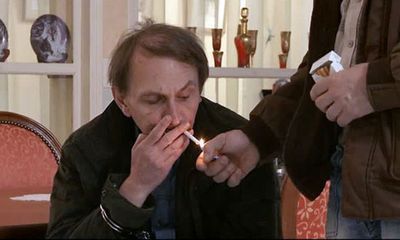Houellebecq the actor
By ADRIAN TAHOURDIN
Michel Houellebecq’s novels undoubtedly have a cinematic quality, and several of them have transferred to the screen: there was a decent attempt at his short first novel L’Extension du domaine de la lutte (1994, Whatever; why didn’t the translator of the novel go the whole hog and call it “Whatevs”?) I haven’t seen the film version of his finest novel Les Particules élémentaires (1998, Atomised), but recall that the film of the frankly not very good Possibilité d’une île (2005) was, as they say, universally panned. Plateforme (2001) and the Goncourt prizewinning La Carte et le territoire (2010) await cinematic treatment.
But it was only a matter of time before the author himself took to the silver screen. The Kidnapping of Michel Houellebecq,directed by Guillaume Nicloux, has him playing himself as the victim of an amateurish kidnap gang of three (one very large, the second a bodybuilder, the third a gentle hard man). While there is something curiously narcissistic about Houellebecq playing himself, he has already placed himself at the centre of his fiction: the best scene in The Map and the Territory involves the discovery of the mutilated body of one Michel Houellebecq. But it has to be said he is the very negation of the matinee idol; indeed there is something sleazy about his onscreen persona; the tics are all there: his curious way of holding a cigarette (and he’s nearly always smoking) between middle and ring finger, his anti-social habits, his terrible dress sense. He appears vulnerable and lost, at one point shuffling through a park holding a large plastic glass of lager.
There is really very little to this film: the author is taken from the brutal high-rise apartment he inhabits on the outskirts of Paris to an equally unprepossessing house an hour outside the city; he spends several days in captivity, is manacled, drinks a lot and has heated conversations about H. P. Lovecraft with his hosts. The fat kidnapper reads him a terrible poem he wrote as a 14-year-old and Houellebecq laughs uncontrollably. Later a local 21-year-old prostitute, Fatima (Marie Bourjala), comes to visit him twice and appears to develop an affection for him. We learn something of Fatima’s troubled family history.
Houellebecq doesn’t appear in a hurry to be released and no ransom is ever discussed, although when he is released after four days he asks, sceptically, whether President Hollande had a hand in his liberation, to be told no. Given its ostensible theme of kidnap and ransom, it was unfortunate that the French Institute’s brief screening of the film opened on the day it was announced that the 55-year-old French mountaineer Hervé Gourdel, who was kidnapped within a day of his arrival in Algeria, had been decapitated by Islamists, in retaliation for France’s involvement in Iraq and Syria.
It’s curious too that the film should receive official approval in the shape of a French Institute screening. For all Houellebecq’s talent as a novelist, I can’t help wondering whether the cultural authorities in France don’t find his public persona embarrassing.
But I did enjoy the closing shots of Houellebecq at the wheel of his spiv ransom-payer’s black Bentley automatic, going down the autoroute at 220 kph. He seemed to be enjoying himself too.
Peter Stothard's Blog
- Peter Stothard's profile
- 30 followers




